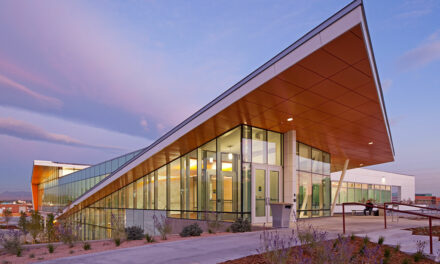Center for Active Design announces first Fitwel Community pilot users, building on a prototype developed with Lendlease
July 31, 2019, New York, NY—The Center for Active Design (CfAD), operator of the Fitwel Certification System, today announces nine of the leaders who are piloting Fitwel Community, a new standard for optimizing holistic health benefits in neighborhood-scale projects. Spanning the public and private sectors, these early adopters include Fitwel Champion Kilroy Realty Corporation, and the first Fitwel Community municipal user, the City of Vancouver, Washington. The Fitwel Community Scorecard builds upon a healthy community prototype developed by CfAD for Lendlease in 2018. This prototype informed the planning, design, and operational priorities of Lendlease’s Horizon Uptown master plan, a 503-acre, mixed-use community in Aurora, CO.
“By underpinning Horizon Uptown’s design with research and community input, Lendlease continues to demonstrate its ability to create communities that offer a dynamic sense of place, are people-oriented, and promote mental and physical well-being,” said Eleni Reed, Head of Sustainability, Americas at Lendlease.
CfAD consulted with Lendlease to optimize quality of life for Horizon Uptown, and to ensure that design and programming reflect the unique priorities of their target market. This collaborative initiative combined insights on local health and quality of life priorities with the global evidence base of Fitwel. The masterplan development emphasizes pedestrian and bicycle connectivity, access to quality open spaces, and programming that strengthens community trust, social bonds, and civic participation.
“The Community Scorecard brings CfAD’s core expertise in neighborhood design and development to the Fitwel certification standard, allowing us to share this knowledge at scale, and to impact projects around the world,” says Joanna Frank, President & CEO at CfAD. “We are grateful to our pilot partners for their leadership in creating market transformation at the neighborhood scale.”
Horizon Uptown joins the first group of trailblazing participants in the 2019 Fitwel Community Pilot. Their insights will contribute to a publicly-available scorecard, anticipated for release in January 2020.
- Camp North End, in Charlotte, North Carolina, led by ATCO Properties, is breathing new life into a former Army base located just outside the central business district, transforming the city’s largest assemblage of historic factories and warehouses into a district for innovation, creativity, and community.
- Crosstown Concourse, in Memphis, Tennessee, where non-profit Crosstown Arts and LRK Inc, teamed up to transform the shuttered Sears and Roebuck, Co. Distribution Center into a dynamic vertical urban village and the community’s place to meet, create, and thrive.
- The Farmer’s Co-Op site at 417 MLK, in Fayetteville, Arkansas, will be reimagined by Specialized Real Estate Group as a mixed-use center, connecting to a vibrant, multi-use trail, creekside recreation, and the City’s Cultural Arts Corridor.
- The Heights District, in Vancouver, Washington, led by the City of Vancouver, GGLO, and VIA, will transform an underutilized mid-century mall site into a vibrant, connected neighborhood center, weaving together existing neighborhood fabric, active parks and open space, complete streets, transit, and a diversity of other uses, including a broad spectrum of mixed-income housing.
- One Paseo, in San Diego, California, led by Kilroy Realty, is a vibrant new addition to the surrounding neighborhood, providing a next-generation lifestyle center with an emphasis on community spirit.
- The Plaza at Santa Monica, in Santa Monica, California, by Clarett Westand OMA, will reshape an entire downtown block as an iconic, mixed-use community hub, infused with specialty retail, cultural spaces, and a marquee public plaza.
- Quartier des Lumières, in Montréal, Québec, led by MACHand designed by Lemay, will reinvent a 20-acre site anchored by the iconic Radio-Canada tower, forming a people-focused mixed-use neighborhood with enlivened streets and an emphasis on environmental harmony and social diversity.
- Silo City, in Buffalo, New York, by Generation Development Group, will reclaim an industrial grain silo complex for the city’s thriving arts scene, offering a sustainability-focused, mixed-use, mixed-income, multigenerational housing model for creatives on the banks of the Buffalo River.
The strategies within the Fitwel Community Scorecard were identified based on an analysis of 5,000+ research studies, as well as a trove of evidence-based resources—including the Assembly: Civic Design Guidelinespublished by CfAD,the Active Design Guidelinespublished by the City of New York, and the Building Healthy Places Toolkit, co-authored by CfAD and published by the Urban Land Institute. Each strategy included in the Community Scorecard impacts at least one of Fitwel’s seven health impact categories (increases physical activity, promotes occupant safety, reduces morbidity and absenteeism, supports social equity for vulnerable populations, instills feelings of well-being, impacts surrounding community health, and enhances access to healthy foods) and reflects the strongest research available linking design with health.
The Fitwel Community Pilot deeply benefits from the leadership of participating firms and municipalities. Their collective input will ensure that the Fitwel Community Scorecard is practical, cost-effective, and scalable. While the pilot participant projects are diverse in terms of geography, demographics, and socioeconomic indicators, they are unified in their commitment to fostering equitable access to a vibrant public realm via health-supporting streets, parks, plazas, and social gathering spaces.
Sign up here to be notified when the Community Scorecard becomes available for public use.


